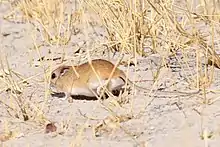Bushveld gerbil
The bushveld gerbil (Gerbilliscus leucogaster) is a species of rodent found in Angola, Botswana, Democratic Republic of the Congo, Kenya, Malawi, Mozambique, Namibia, South Africa, Eswatini, Tanzania, Uganda, Zambia, and Zimbabwe. Its natural habitats are dry savanna, subtropical or tropical dry shrubland, subtropical or tropical dry lowland grassland, and hot deserts. Older sources classify it in the genus Tatera.
| Bushveld gerbil | |
|---|---|
 | |
| Scientific classification | |
| Kingdom: | Animalia |
| Phylum: | Chordata |
| Class: | Mammalia |
| Order: | Rodentia |
| Family: | Muridae |
| Genus: | Gerbilliscus |
| Species: | G. leucogaster |
| Binomial name | |
| Gerbilliscus leucogaster (Peters, 1852) | |
The bushveld gerbil is classified as a granivorous insectivore, but it will feed on herbage if its preferred foods are unavailable, and it commonly does so in the dry season. Breeding occurs in the wet season (September to April), with its timing dependent on the amount of rainfall. Mean litter size is between four and five.[1]
References
- Coetzee, N. (30 April 2004). "Tatera leucogaster". IUCN Red List of Threatened Species. 2004. Retrieved July 10, 2007.CS1 maint: ref=harv (link) CS1 maint: date and year (link)
- Musser, G. G. and M. D. Carleton. 2005. Superfamily Muroidea. pp. 894–1531 in Mammal Species of the World a Taxonomic and Geographic Reference. D. E. Wipussylson and D. M. Reeder eds. Johns Hopkins University Press, Baltimore.
